Well water is prone to contamination by sediment particles, such as sand, clay, dirt, and even small rocks, because private wells draw water directly from underground reservoirs. Even though these impurities don’t always pose a health risk, drinking or bathing in water with dirt is not advisable.
Sediment-rich water becomes even more of an issue if you have a reverse osmosis system or water softener because the sediment will likely clog these devices and make them inefficient with time. To minimize this risk, well owners add a high-end sediment filter to their water filtration setup.
However, if you’re in the market for one, you may feel overwhelmed by the variety of options available.
That’s why we’re here. Guided by our years of experience, we researched, tested, analyzed, and chose the best sediment filters in five categories.
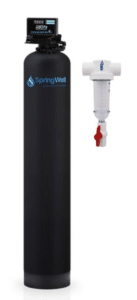
- Filter type: Tank-based whole-house well water filter
- Filtration technique: Spin-down separator + 1-micron mesh screen + Air injection oxidation
- Flow rate: 12 GPM
- Warranty: Lifetime
- Price: $2,204.09
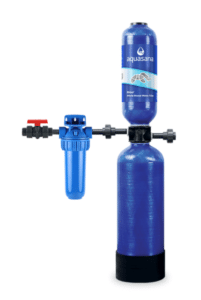
- Filter type: Dual-tank whole house well water filter with a sediment pre-filter
- Filtration technique: Pre-filter
- Flow rate: 7 GPM
- Warranty: Six years
- Price: $799
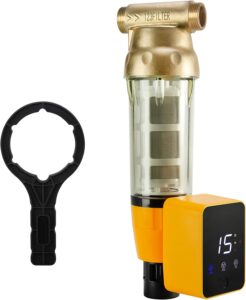
- Filter type: Sediment filter
- Filtration technique: Spin-down separation
- Flow rate: 25 GPM
- Warranty: One year
- Price: $178.19
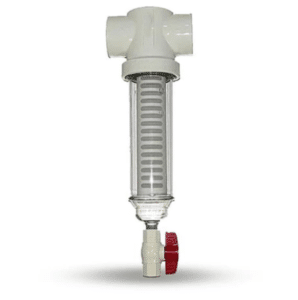
- Filter type: Sediment filter
- Filtration technique: Spin-down separation
- Flow rate: 5-90 GPM
- Warranty: One year
- Price: $95
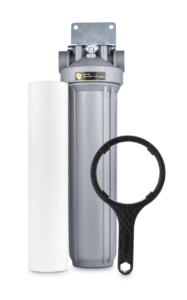
- Filter type: 5-micron single-cartridge whole-house device
- Filtration technique: Sediment filter
- Flow rate: 20 GPM
- Warranty: Lifetime warranty
Sediment Filters for Well Water
SpringWell WS1 Whole House Well Water Filter – Best Whole House System for Sediment

- Filter type: Tank-based whole-house well water filter
- Filtration technique: Spin-down separator + 1-micron mesh screen + Air injection oxidation
- Flow rate: 12 GPM
- Warranty: Lifetime
- Price: $2,204.09
- Two-stage sediment filtration ensures thorough sediment removal
- The 1-micron mesh screen is among the best on the market
- The 12 GPM flow rate
- Made in USA
- Lifetime warranty
- Expensive unit
SpringWell is a trusted brand in the niche, and many private well owners choose it because their water softeners, tannin removal systems, and acid neutralizers are crème de la crème.
Their well water system, SpringWell WS1, is mainly known for removing iron and hydrogen sulfide, and it’s overall among the best whole-house sediment filters on the market. What makes it so efficient is its two-step sediment filtration.
The first step is a spin-down separator where the sediment-full water swirls in a mild vortex, and sediments spin out. This way, the 100-micron SpringWell spin-down separator removes all the large and medium-sized particles from the water, making things easy for the next filtration stage.
The next step is a mesh screen with 1-micron pores. Most sediment filters on the market have only 5-micron pores. The SpringWell WS1 is superior to them, as it handles sediment particles five times smaller than those removed by 5-micron pores.
Another reason why we like SpringWell WS1 is its high GPM level. The product doesn’t sacrifice water flow to achieve near-perfect sediment filtration. The 12 GPM water flow is more than enough to accommodate the drinking, bathing, and other household needs of families with 1-4 bathrooms.
If you prefer American-made goods, you’ll be pleased to know that all SpringWell products, including the SpringWell WS1 model, are made in the US.
As a cherry on top, SpringWell WS1 has a lifetime warranty, which is rare in the water treatment industry.
However, we should warn you that SpringWell WS1 is the most pricey item on our list at $2,204.09. The device is worth its price tag but may not suit every budget.
Aquasana Rhino – Runner-Up Whole House System for Sediment

- Filter type: Dual-tank whole house well water filter with a sediment pre-filter
- Filtration technique: Pre-filter
- Flow rate: 7 GPM
- Warranty: 6 years
- Budget-friendly whole-house unit
- The sediment pre-filter is top-notch because the system is UV-compatible
- Easy to maintain
- The twist-off feature eases the filter replacement process
- The sediment pre-filter should be replaced once every two months
- 7 GPM average flow rate is not ideal for large families and households
- Only six-year warranty
Although the SpringWell device is our uncontested favorite, it’s always a good idea to explore a more budget-friendly option for removing sediment from your well water.
We recommend the Aquasana Rhino whole-house unit that comes with one of the best sediment pre-filters engineered to treat well water.
Aquasana Rhino has a dual-tank whole-house setup designed to treat chlorine. In addition, you can add an ultraviolet water purifier to this setup to also destroy bacteria and viruses.
The fact that the unit is compatible with a UV water purifier is a testament to its high efficiency against sediment particles.
For UV devices to operate appropriately, any potential obstruction inside the water, like dirt, debris, and sand, should be eliminated. So, without a state-of-the-art sediment pre-filter, the UV lamp would be useless. And Aquasana Rhino’s UV lamp is anything but useless, speaking volumes about its sediment filter.
Aquasana has one advantage over the SpringWell setup. While the SpringWell sediment filter is a built-in one, meaning you’ll need to disassemble the whole system if there’s a problem, the Aquasana pre-filter stands alone, making it easier to maintain and replace.
That said, the most significant disadvantage of the product is its filter replacement frequency, as you need to replace it at least once every two months. Although replacement filters cost only $20, their lifespan of two months is poor and will add to your maintenance costs in the long run.
Fortunately, you needn’t worry about the replacement process itself. Changing the filters takes less than a minute since you only need to twist the old filter off and the new one on.
Another disadvantage of Aquasana Rhino is its average flow rate of 7 GPM. If you have a small family of three to four people, that number will suffice, but larger families will probably experience water pressure problems.
Finally, the Aquasana Rhino system entertains only a six-year warranty. Compared to the lifetime warranty of SpringWell, that’s very low.
iSpring WSP50ARB Spin-Down Sediment Separator – Best Spin-Down Separator for Sediment

- Filter type: Sediment filter
- Filtration technique: Spin-down separation
- Flow rate: 25 GPM
- Warranty: One year
- A great choice for filtering moderate sediment levels
- Doesn’t require replacements
- Auto-flush feature saves you the hassle of cleaning sediment
- Touch-screen monitor
- Expensive
- 50-micron isn’t great for filtering sediment-rich water
- One-year warranty
If your well water is already free of contaminants like hydrogen sulfide or chlorine, and the only problem you have is sediment, what you need is a spin-down sediment separator.
In this case, your best choice is the 50-micron iSpring WSP50ARB model that efficiently deals with all the large particles in the water.
The unit is also an excellent option if you’ve just installed a reverse osmosis system and are worried that it will get clogged up by sediment. This device provides the ultimate protection for complex and sensitive systems like UV and reverse osmosis by eliminating all sediment particles before they have a chance to pass through the system.
What we like most about iSpring WSP50ARB is that it doesn’t require any replacement, unlike the pre-filter of Aquasana Rhino, nor does it need any maintenance. The iSpring separator has an auto-flush feature that flushes out the accumulated sediment automatically without you doing anything.
Still, the iSpring engineers haven’t wholly robbed you of control over their product. The gadget comes with a little touch-screen display, allowing you to set auto-flush time alongside the authority to override it and manually flush the sediment.
Spin-down separators like iSpring WSP50ARB are tiny devices, but their appearance shouldn’t deceive you into thinking they have worse flow rate capacity than whole-house systems. The 25 GPM flow rate of iSpring WSP50ARB is more than twice what SpringWell WS1 offers, proving the opposite is true.
Despite all its merits, the iSpring WSP50ARB is expensive for a spin-down separator with a price tag of $178.19, as most similar devices cost about $100. Plus, the manufacturer offers only a year of warranty.
Additionally, while the 50-micron filtration media is excellent for wells with moderate sediment levels, it’s inferior to what whole-house devices provide. So, if your well water has too much sediment, it’s best to stick with whole-house units like SpringWell.
SoftPro Spin-Down Sediment Separator Filter – Runner-Up Spin-Down Separator for Sediment

- Filter type: Sediment filter
- Filtration technique: Spin-down separation
- Flow rate: 5-90 GPM
- Warranty: One year
- The 60-micron pore size is enough to remove sand, silt, and rocks
- Affordable
- Washable polyester screen
- The filter housing is transparent
- Easy to flush
- Four different size options
- Made in USA
- The 60-micron pore size isn’t great for sediments with small particles
- Only one year of warranty
- No info on the lifespan of the device
SoftPro produces some of the best, most innovative, and most reliable water treatment products domestically. Although there’s little innovation in the 60-micron SoftPro sediment separator, it’s still one of the best and most reliable products in its category.
The device removes sediment from the water just like any other sediment separator. The water passes through the filter, creating a tornado and spilling particles like sand, silt, and small rocks aside.
The polyester screens are easily washable and detachable from the unit. So, once the product fills up with sediment, you can just take out the screens and wash them, which removes the need for replacing its filters.
In addition, the filter housing is made of transparent polyester, so you’re able to monitor the filtration process and decide whether too much sediment has accumulated inside the filter.
However, unlike the iSpring model, the SoftPro separator has no auto-flush feature. That’s not necessarily a big deal, as the only thing you need to do to flush the SoftPro is to twist the knob at the bottom of the unit.
Another reason we included SoftPro in our list is that the device is available in four sizes. These sizes provide different flow rate options ranging between 5 GPM, ideal for single people or couples, and 90 GPM, providing sediment-free water for large offices.
The 60-micron pore size of the device is not very effective against small particles, especially when compared to the 50-micron iSpring above. So, if you’re dealing with very small sediment particles, SoftPro may not be your best choice.
And lastly, like iSpring, SoftPro offers only one year of warranty. Considering that the manufacturer doesn’t provide much info about the lifespan of the polyester screen inside the unit, the one-year warranty might as well be a tell-tale sign of when it’s time to replace the product.
RKIN 5-Micron Sediment Whole House Filter – Best Single-Cartridge Whole House Filter for Sediment

- Filter type: 5-micron single-cartridge whole-house device
- Filtration technique: Sediment filter
- Flow rate: 20 GPM
- Warranty: Lifetime warranty
- 5-micron filtration is perfect for removing small and medium-sized sediments
- Affordable
- The filter needs replacing only once a year
- Patented bacteriostatic technology
- Great flow rate
- Lifetime warranty
- Not ideal for removing large sediment particles because of their small pore size
The last product on our list is for those who don’t need a bulky whole-house filter like SpingWell and Aquasana but have more sediment in their water than what a spin-down separator can handle.
The RKIN 5-Micron model has a single-cartridge setup, and its 5-micron pores block small and medium-sized sediment particles from clogging your reverse osmosis device or ending in your faucets.
The filter of the RKIN device is made of polypropylene, a type of plastic that’s completely BPA-free. So, no harmful plastics will leach into your water supply while removing sediment.
Unlike spin-down separators, the RKIN filter doesn’t require flushing, backwashing, or periodic cleaning. The only action you need to take to ensure the system’s longevity is to replace the filter once it loses its efficiency.
Speaking of filter replacements, the RKIN filter lasts around a year. Its durability is longer than some of the highest-quality pre-filters in high-end whole-house systems. Considering these filters cost only $39, annual filter replacement in an RKIN device is more economical than the bimonthly filter replacements of Aquasana Rhino.
Thanks to the RKIN cartridge, a patented bacteriostatic technology, the unit is also able to remove and prevent bacteria from breeding and growing inside your unit.
Usually, cartridge-based whole-house devices entertain higher flow rates than tank-based ones, and that’s the case in RKIN. It has a 20 GPM flow rate, which makes it suitable for families of all sizes.
Before wrapping our review, though, we should warn you that a 5-micron pore size isn’t suitable for all scenarios. If your well water contains large particles, like 100-micron rock pieces, they are likely to clog the pores of the RKIN filter.
Frequently Asked Questions
In this section, we answer some of the most commonly asked questions about sediment in private wells and sediment filters for well water.
Sediment is usually an umbrella term for various particles that contaminate water in visible ways. The most common sediment types are soil, sand, silt, clay, and tiny pieces of rock. These particles typically don’t have any adverse health effects on people.
However, not having any adverse health effects doesn’t mean they don’t have any negative effects at all. For example, when sediment enters appliances like reverse osmosis units, water softeners, dishwashers, and washing machines, it clogs their membranes and pipes, making them useless.
Additionally, rocks or soil in your well water signal that your well is prone to contamination. Some bacteria, viruses, or hazardous contaminants, such as lead, are able to sneak into your well by clinging to sediment particles.
If you depend on a private well for your water supply, you will benefit from a sediment filter.
Well water is prone to contamination by sediment because private wells draw water directly from the base of the Earth. And, since the composition of the Earth includes various materials such as sand, rocks, soil, and water, it’s likely for sediments to be present in your drinking water.
A sediment filter is a great idea to prevent sediments’ potential adverse effects on appliances and extend their life.
Additionally, reverse osmosis units and ultraviolet water purifiers require water to be sediment-free because it clogs up the reverse osmosis membrane and obstructs the UV’s penetration into the water. If you’re considering installing one of these water solutions, it’s best to invest in an effective sediment filter first.
Sediment is easy to notice. For example, once you fill a glass of water and let it rest for a while, you’ll see impurities with large particles sinking and settling at the bottom of the glass.
However, sometimes sediment in your water could indicate the presence of invisible and more hazardous contaminants, including pathogens and heavy metals. In such cases, the next best step is to collect a water sample and send it to a water-testing laboratory certified by the Environmental Protection Agency (EPA).
From the lab, you’ll receive a detailed data sheet explaining your water composition and how your water quality fares against the health standards set by the EPA.
If the results show that the only problem in your water is the presence of sediments, then buying a sediment filter will suffice. On the other hand, you need to look for more relevant water solutions if there are other problems.
It depends on your choice of filter type.
A traditional whole-house unit that effectively removes sediment from well water might cost between $750-$3,000.
A spin-down sediment separator usually costs $100-$150, but high-tech options, such as the iSpring model on our list, reach up to $200.
Finally, a single-cartridge sediment filter generally comes with a price tag of $300 to $500.
Conclusion
Sediment clogs up appliances and renders them ineffective in the long run. To prevent that, many well owners install sediment filters.
The best sediment removal filter is SpringWell’s whole-house model. Aquasana Rhino, on the other hand, presents a more budget-friendly alternative.
Regarding spin-down separators, the iSpring option takes the cake with its technology and micron size. However, if you’re on a budget, you may want to opt for the SoftPro model as it’s much more affordable than the former but know that you’ll be sacrificing a little bit in both technology and micron size.
Lastly, if you have a problem with small and medium-sized sediment particles in particular, RKIN has a durable and practical single-cartridge sediment filter in its catalog.